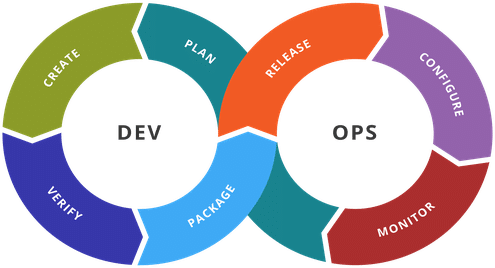Release engineering is often confused with DevOps. There is a good reason. The roles and responsibilities often overlap. DevOps can be considered a superset of release engineering.
Release Engineering
Release engineering is a discipline that concentrates on the deployment of software. It tries to make better quality software at a reliable and predictable rate. Its mandate is to improve the software build and release pipeline. Here are some things release engineering emphasizes:
- Implements Version Control – Release engineering tries to add traceability and reliability to the code. So the code is maintained in version control repositories like Git, SVN, Perforce, etc. Development teams use these version control systems to better keep track of code evolution.
- Automates Build and Release Pipelines – Release engineering concentrates on finding automation tools to improve the speed and reliability of the release process. From the first code-commit into version control to the final product reaching the customer, release engineering keeps improving the process. Continuous integration and continuous delivery (CI/CD) plays an important role in modern automated build/release systems.
- Configuration Management – As software code moves through various cycles of the development, testing, staging, and production, configuration management ensures the product attributes are consistent throughout the software lifecycle.
- Production and Deployment – Every piece of software that goes out to the customer in a production environment needs to be closely tied to its origin. So if there is a problem, businesses can retrace it back to the source.
DevOps
DevOps has a wider mandate. It concentrates on creating cross-functional collaboration between teams.
In the past, development teams and operations teams worked in their own silos. When development teams deployed their code in production, there would be heated discussions about who would take responsibility for any production problems. Also, the development team would want the latest and coolest features deployed, while operations team would want to stay away from taking any risks. It led to constant conflict between the two groups.
The purpose of DevOps practices was to bring development and operations closer together. Here are some things DevOps concentrate on:
- Infrastructure Setup and Provisioning – Traditionally, IT departments planned and provisioned infrastructure. DevOps philosophy encourages a more developer-centric approach. The pipeline is created to facilitate development process to go through the various stages and cycles frictionlessly. Developers have more responsibility for how their applications behave in production.
- Configuration Management – DevOps teams take a wider view of configuration management. While release engineering might use it for the software products only, DevOps practices find ways to implement configuration management to every aspect of an organization. The purpose is to help the whole organization run a smoother operation through automation.
- CI/CD – Continuous integration and continuous delivery is a big part of the DevOps philosophy. A mature DevOps practice uses CI/CD to automate traditional IT tasks by using infrastructure as code.
- Organizational Monitoring and Improvements – DevOps practices emphasize collecting data on processes to analyze and improve. So collecting data, transforming it into actionable intelligence and using it to improve current processes is an important DevOps responsibility.
In Conclusion
Due to the intersection of software process improvement concerns, release engineering is often confused with DevOps. But DevOps have a larger scope. While release engineering can live as a separate department, DevOps requires more integration with the organization’s overall workflow. It’s easier to set up a release engineering practice as the steps are concrete. DevOps requires an understanding of the organizational behavior, the work culture, and the infrastructure. Successful DevOps is not about the product only, it’s about the whole organization.

